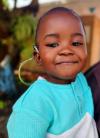World Hearing Day: Why early detection is important
The Western Cape Department of Health and Wellness encourages individuals of all ages on World Hearing Day (3 March), to empower themselves and others by adopting and promoting safe listening and good hearing care. This includes protecting one’s hearing from loud sounds, having regular hearing checks, using hearing devices if needed, and supporting those with hearing difficulties.
According to the World Health Organization (WHO), by 2030, over 500 million people worldwide are expected to have disabling hearing loss. Over one billion young people face the risk of permanent damage to their hearing due to prolonged exposure to loud sounds during recreational activities such as gaming and listening to music.
In line with year’s theme, Empower yourself to make ear and hearing care a reality for all, Jenny Birkenstock, Assistant Director of the Department of Speech Therapy and Audiology at Tygerberg Hospital (TBH) said, ”For individuals living with hearing loss, early identification and access to timely rehabilitation are essential for good outcomes.”
The audiology services at the hospital include:
- Newborn hearing screening
- Diagnostic hearing testing for all age groups
- Management of hearing loss through referral for specialist medical assessments
- Cochlear implant evaluation
- Hearing aid fitting
The Audiology Department liaises closely with the Carel du Toit Centre for Hearing Impaired Children to ensure that infants, young children and their families are supported and empowered in their journey towards hearing rehabilitation.
The story of 18-month-old Bunono Qutwa from Khayelitsha brings home the message of “teamwork is dreamwork” when it comes to supporting and empowering a young hearing-impaired child and his family. He was born 3 months prematurely, weighing 1 180 g, and was admitted to the hospital’s Neonatal Intensive Care Unit (NICU). While in hospital, he failed his newborn hearing screening tests, which raised concern about his ability to hear. He had several risk factors for hearing loss.
A diagnostic hearing evaluation followed and Bunono was diagnosed with permanent profound hearing loss in both ears at the age of 6 months (3 months corrected age). He was fitted with hearing aids at Tygerberg Hospital and began weekly early intervention sessions with his mother at the Carel du Toit CHAT (Children Hearing and Talking) Centre at the age of 8 months (5 months corrected age).
Bunono did not benefit from hearing aids due to the severity of his hearing loss. He was referred for cochlear implantation in June 2024 as his family chose spoken language as his mode of communication. They were committed to his listening and spoken language rehabilitation, and he was not getting enough access to sound with hearing aids alone.
Bunono was the fortunate recipient of a Netcare-donated cochlear implant. His implant was done by Professor James Loock at Netcare N1 City on 04 December 2024. His cochlear implant sound processor was donated by Mrs Maggie Farnham, an adult cochlear implant user from the Tygerberg Hospital/Stellenbosch University Cochlear Implant Programme. He was activated on 1 January 2025 with a clear response to the new electrical sound.
On 14 February 2025, Bunono’s devoted single mom, Hluma, said, “Today marks a month for Bunono being able to hear and it has been a wonderful and adventurous journey because he teaches me a lot of patience and how to be a mom.”
Bunono’s early intervention therapist, Ms Sue Rumble, commented that “Hluma and Bunono have a lovely close bond, and it is a delight to see them growing together as Bunono now has access to sound. At one-month post activation of his cochlear implant, Bunono is responding to his name and attempting to imitate speech sounds. He indicates when his speech processor has fallen off and requests that it is put back on pronto!”
Ms Birkenstock concluded, “Early diagnosis and access to sound through cochlear implantation is giving Bunono the opportunity to develop to his full potential. His story highlights what is possible through the commitment and collaboration of dedicated family members, professionals, donors and institutions from the public and private sectors.
Bunono’s case met the Early Hearing Detection and Intervention (EHDI) international gold standard of screening by 1 month of age, diagnosis by 3 months of age and intervention by 6 months of age (for his corrected age, considering prematurity). Research evidence indicates that an infant with hearing impairment who receives early intervention within the first 6 months of life, can learn to communicate verbally and is likely to have speech, language and cognitive development comparable to normal hearing peers. This contrasts with persistent delays for those whose hearing loss is identified late. “
How to Prevent Noise-Induced Hearing Loss
- Turn the volume down
- Walk away from loud noise
- Take breaks from noise
- Avoid loud, noisy activities and places
- Use hearing protection
How to access support
We are committed to providing access quality healthcare. For both children and adult audiology services, seek assistance at your primary healthcare facility with the necessary documents such as your ID and any medical history. Our healthcare staff offer valuable guidance on prevention, early signs and further guidance on referrals for specialised care such as audiology.
Western Cape Minister of Health and Wellness, Mireille Wenger, added, "We want everyone in the Western Cape to start life well, live well, and age well. Hearing loss can have a profound impact, not only on a person’s well-being but also on their dignity and access to opportunities. Whether it affects a child’s development or an elderly person’s ability to stay connected, it’s important to get tested and take steps to address it. By doing so, we can help people live fuller, more empowered lives."



